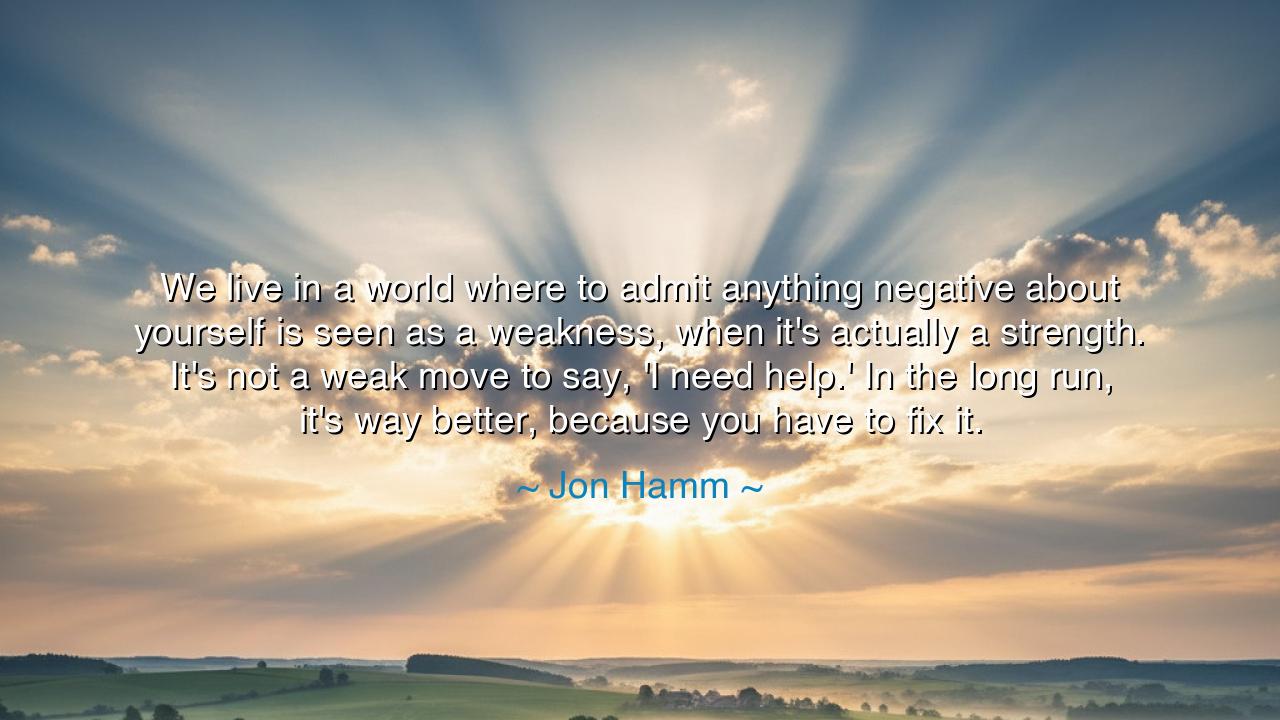
We live in a world where to admit anything negative about
We live in a world where to admit anything negative about yourself is seen as a weakness, when it's actually a strength. It's not a weak move to say, 'I need help.' In the long run, it's way better, because you have to fix it.






Jon Hamm, with words forged in honesty and borne of trial, once declared: “We live in a world where to admit anything negative about yourself is seen as a weakness, when it’s actually a strength. It’s not a weak move to say, ‘I need help.’ In the long run, it’s way better, because you have to fix it.” In this saying lies a truth often forgotten by the proud: that the soul’s greatest courage is not to conceal its wounds, but to unveil them; not to stumble alone in silence, but to reach out for healing. What the world mistakenly brands as weakness is, in truth, a deeper form of strength.
The meaning of these words overturns the false pride of our age. For men and women are taught to wear masks of perfection, to guard their struggles behind iron walls, as if showing pain were shameful. Yet Hamm reminds us that it is far easier to hide than to reveal, far easier to pretend than to confess. To cry, “I need help,” is to lower the armor and expose the heart; such an act requires a bravery greater than any battlefield charge. For what is weakness, if not stubborn denial of the truth? And what is strength, if not the will to confront, to confess, and to heal?
The origin of Hamm’s words may be found in his own journey. Known to the world as an actor of commanding presence, he endured seasons of deep sorrow, losing his parents early and battling depression in his youth. He sought help through therapy, choosing not to be consumed by despair but to face it with honesty. Out of this lived struggle comes his wisdom: that no man is diminished by seeking aid, but rather elevated, for he has chosen the path of healing over the abyss of silence.
History bears witness to the same truth. Consider the tale of Abraham Lincoln, revered as one of the strongest leaders in history. Yet throughout his life he wrestled with melancholy so profound it nearly unmanned him. Did he hide it? No—he sought the company of friends, the refuge of honest counsel, and the strength of words and writing to steady his spirit. In this openness lay his endurance, and through it he found the power to lead a nation through its darkest hour. His greatness was not in the absence of sorrow, but in the courage to admit it and seek strength beyond himself.
The imagery within Hamm’s words is stark: a world where confession is seen as weakness. It is a barren world, one that worships illusions of power while scorning truth. But Hamm shines a light upon this darkness, teaching us that admitting fault, acknowledging need, and asking for help are the hidden keys to growth. For a wound left untended festers, but a wound confessed can be healed. To fix what is broken, one must first have the humility to admit that it is broken.
The lesson for us, then, is both humbling and empowering. If you stumble, do not hide. If you struggle, do not cloak it in silence. Speak aloud, “I need help,” for those words summon strength greater than your own. In admitting, you invite healing; in confessing, you discover courage. And in doing so, you become an example to others who suffer in silence, showing them that there is no shame in honesty, only liberation.
Practically, this means to practice openness with those you trust. If you face burdens too heavy, reach for a friend, a mentor, a guide. If shadows press upon your spirit, seek counsel, whether of a healer, a confidant, or a community. Do not allow the world’s false measure of strength to chain you in silence. Instead, embrace the deeper strength of honesty, for it alone leads to restoration.
Thus, take Hamm’s words as a shield against pride and despair: it is not weakness to admit you need help—it is the highest form of courage. Let this be passed down as wisdom to future generations: that a strong man is not one who hides his pain, but one who faces it with honesty, heals it with humility, and rises renewed to live with truth. For only such strength can endure, and only such courage can lead others into the light.






AAdministratorAdministrator
Welcome, honored guests. Please leave a comment, we will respond soon